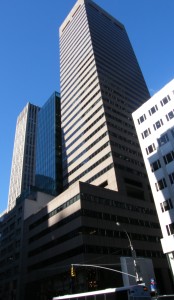
September 20-2013
A federal judge says the US government might be able to seize a 36-story Fifth Avenue office tower worth hundreds of millions of dollars because a part owner acted as a front for Iran and a funnel through which to sneak US funds illegally to Iran’s Bank Melli.
The seizure might turn out to be good for the Islamic Republic, because that would likely prevent US “victims of terrorism” from being able to seize it and keep it permanently out of Iran’s hands.
US District Judge Katherine Forrest ruled Monday that Assa Corp. violated the US trade embargo against Iran. And she ridiculed Iranian claims in a harsh manner not usually used by judges.
The US filed suit to seize the building, at 650 Fifth Avenue, in 2008. Forrest said Assa Co. was a shell company that violated money laundering laws by transferring funds to Bank Melli, Iran’s national bank.
“The court has found that, based on the incontrovertible record evidence, Assa was—and is—a front for Bank Melli, and thus a front for the government of Iran,” Forrest wrote in her 82-page decision.
Built in the late 1970s, the building is estimated to be worth over half a billion dollars.
The US government argued that the Alavi Foundation’s sole partner in the ownership of the building, Assa Co., was a shell company fronting for a secret interest held by the state-owned Bank Melli.
The judge agreed that monetary transfers by Assa to Bank Melli violated money laundering statutes.
“There is substantial, un-contradicted evidence that Assa is owned and controlled by Bank Melli, and that Bank Melli is wholly owned and controlled by Iran,” the judge said.
She rejected Alavi’s “core defense,” that a jury should decide whether the foundation knew that Assa was controlled by Iran between 1995, when providing services to Iran became illegal, and the 2008 date of the lawsuit. She said that many of the Alavi board members who were indisputably involved in the creation of Assa as a front for Bank Melli in 1989 remained with or returned to positions with Alavi after 1995.
The Alavi Foundation is the Islamic Republic’s name for the organization that took over the assets of the Shah’s Pahlavi Foundation after the 1979 revolution.
“The Government argues that Alavi asserts a sort of collective amnesia,” the judge said. “The court finds the analogy apt and its reality implausible. No rational juror could believe in such extraordinary amnesia.”
She wrote, “There is a far broader violation—one that involves not simply an unknowing and innocent provision of services to Iran, but providing those services to assist Iran by shielding and concealing Iranian assets.”
The ruling on the Fifth Avenue building does not address seven other properties around the country that are in Alavi’s name only. Those properties include mosques and Islamic schools.
The foundation said it was “obviously disappointed” with the judge’s decision granting partial summary judgment against it. It said it disagreed with the court’s analysis of the facts and the law and intended to appeal.
“The Foundation was ready for trial and is disappointed that it did not have the opportunity to rebut the Government evidence before a jury,” Alavi said.
The judge, in her opinion, said the building was subject to forfeiture on the money laundering accusations described by the US government.
“The alleged money laundering occurred when the partnership, Alavi, and Assa Corp. distributed the rent with the intent to conceal that it was meant for the benefit of the Iranian government and caused partnership funds to be transferred abroad,” she wrote. “Having engaged in a money laundering violation, the entirety of the 650 Fifth Avenue Building—the business premises—and all of the associated bank accounts are subject to forfeiture — even if they were not used in the money laundering offense itself.”
